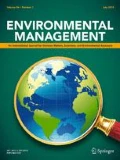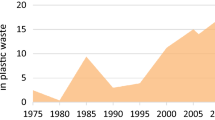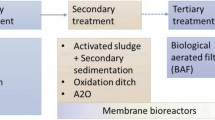Abstract
Although pharmaceuticals treat illnesses and prevent diseases in humans and animals, ironically, they are now among the emerging pollutants in the environment. As individuals continue to consume medicines, households can become a primary source of pharmaceutical pollutants. This paper explains relevant Malaysian law and policy on the issue. Using a questionnaire survey, it also assesses public perception concerning the environmental impact of pharmaceutical waste and the current methods of disposal that are practiced in Selangor. The survey used a convenience sampling and the data collected were analysed using statistical descriptive analysis. Most of the participants were aware that pharmaceutical waste can have an adverse impact on the environment and public health. Half of the participants disposed of their pharmaceutical waste in trash bins. About 2.9% of the respondents poured their household pharmaceutical waste (HPW) directly down the drain, while 8.8% poured them down the sink in the kitchen or toilet. The study also discovered that while 73.8% of the respondents felt that HPW should be separated from other household solid waste, only 25.2% returned their medicinal waste through the medicine return-back programme. The majority of the respondents (82.5%) agreed that information concerning the proper disposal of HPW is insufficient. The study concludes that while the respondents were aware of the adverse impact of HPW, their practices to ensure proper disposal is discouraging. There is a need for effective unwanted medicines return-back programme as a more prudent disposal method of HPW to avoid any risk to the environment or human health.



Similar content being viewed by others
Notes
The premises that have been designated as “prescribed premises” under the Environmental Quality (Prescribed Premises) (Scheduled Wastes Treatment and Disposal Facilities) Order 1989 comprise licensed off-site storage facilities, off-site treatment facilities, off-site recovery facilities, scheduled waste incinerators, land treatment facilities or secure landfills.
Regulation 25 of the Poisons (Psychotropic Substances) Regulations 1989.
S12014/349: The National Health Service (Pharmaceutical and Local Pharmaceutical Services) Regulations 2013.
British Columbia Regulation of the Environmental Management Act (BC Reg. 449/2004). Regulation 5.
This plan is designed to collect and properly dispose of unused or expired health products from the residential sector. Products included in this plan are all prescriptions drugs, over-the-counter medications, and natural health products.
The Health Products Stewardship Association (HPSA).
British Columbia Regulation of the Environmental Management Act (BC Reg. 449/2004). Regulations 10 and 12.
British Columbia Regulation of the Environmental Management Act (BC Reg. 449/2004). Regulations 11 and 13.
References
Abahussain EA, Ball DE, Matowe WC (2006) Practice and Opinion towards disposal of unused medication in Kuwait. Med Princ Pract 15(5):352–357. https://doi.org/10.1159/000094268
Agamuthu P, Dennis V (2011) Policy Evolution of solid waste management in Malaysia. International Solid Waste Association Congress 916–924. http://eprints.um.edu.my/id/eprint/12896
Ahmed A, Mushtaq N, Tariq M, Durrani M, Akhtar S, Arif M, Yasmeen G (2007) Disposal practices of unused and expired pharmaceuticals in Karachi and their impact on health and environment. JUMDC 4(2):42–48
Al-Naggar RA, Alareefi A (2010) Patients’ opinion and practice toward unused medication disposal in Malaysia; a qualitative study. Thai J Pharm Sci 34:117–123
Al-Odaini NA, Zakaria MP, Yaziz MI, Surif S, Abdulghani M (2013) The occurrence of human pharmaceuticals in wastewater effluents and surface water of Langat River and its tributaries, Malaysia. Int J Environ Anal Chem 93(3):245–264. https://doi.org/10.1080/03067319.2011.592949
Al-Qaim FF, Abdullah MP, Othman MR, Latip J, Afiq WM (2013) Development of analytical method for detection of some pharmaceuticals in surface water. J Pharm Res 12(4):609–616. https://doi.org/10.4314/tjpr.v12i4.25
Amaral MJ, Fop L (2013) Unused Pharmaceuticals Where Do They End Up? A snapshot of European Collection Schemes. Health Care Without Harm, Europe
Angi’enda SA, Bukachi SA (2016) Household knowledge and perception on disposal practices of unused medicines in kenya. J Anthropol Archaeol 4(2):1–20. https://doi.org/10.15640/jaa.v4n2a1
Ariffin M (2019) Enforcement of environmental pollution control laws: a Malaysian case study. Int J Public Law Policy 6(2):155–169. https://doi.org/10.1504/IJPLAP.2019.097559
Ariffin M, Wan Yacoob WNA (2017) Assessment of knowledge, attitude and practice of solid waste open burning in terengganu, malaysia. environment. Asia 10(2):25–32. https://doi.org/10.14456/ea.2017.18
Aus der Beek T, Weber FA, Bergmann A, Hickmann S, Ebert I, Hein A, Küster A (2016) Pharmaceuticals in the environment-Global occurrences and perspectives. Environ Toxicol Chem 35(4):823–35. http://www.ncbi.nlm.nih.gov/pubmed/26666847
Bain KT(2010) Public health implication of household pharmaceutical waste in the United States Health Serv Insights 3:21–36. https://doi.org/10.4137/HSI.S4673
Baresel C, Cousins AP, Ek M, Ejhed H, Allard AS, Magner J et al. (2015) Pharmaceutical residues and other emerging substances in the effluent of sewage treatment plants: Review on concentrations, quantification, behavior, and removal options. Swedish Environmental Research Institute, Sweden
Bisceglia KJ (2010) Occurence and fate of pharmaceuticals, illicit drugs, and other emerging contaminants in natural and engineered environments. The Johns Hopkin University
Bound JP, Voulvoulis N (2005) Household disposal of pharmaceuticals as a pathway for aquatic contamination in the United Kingdom. Environ Health Perspect 113:1705–1711. https://doi.org/10.1289/ehp.8315
Chander V, Sharma B, Negi V, Aswal RS, Singh P, Singh R et al. (2016) Pharmaceutical compounds in drinking water. J Xenobiotics 6(5774):1–7. https://doi.org/10.4081/xeno.2016.5774
Chin TS (2017) Leftover medications: Throw, flush or reuse? Star2. https://www.star2.com/health/wellness/2017/04/09/extra-drugs-throw-them-flush-them-or-reuse-them/. Accessed 31 Jan 2019
Cyclamed Le Reflexe (2014) Annual Report 2014. http://www.cyclamed.org/wp-content/uploads/2015/06/Rapport-annuel-v-anglaiseHD-.pdf. Accessed 4 Mar 2019
Department of Statistic Malaysia (2019) Time Series Data. Employed persons by educational attainment, Malaysia/states, 1982–2018. Department of Statistics Malaysia, Putrajaya. https://www.dosm.gov.my/v1/uploads/files/3_Time%20Series/LFS_1982-2018/06.TABLE_6.pdf. Accessed 15 June 2019
Department of Statistic, Malaysia (2018) Selected Demographic Indicators Malaysia, 2018. Department of Statistics, Malaysia, Malaysia
Economic Planning Unit (2010) Tenth Malaysia Plan 2011–2015. Economic Planning Unit, Putrajaya
Fenech C, Rock L, Nolan K, Morrissey A (2013) Attitudes towards the use and disposal of unused medications in two European Countries. Waste Manag 33(2):259–261. https://doi.org/10.1016/j.wasman.2012.12.018
Hinton PR, Brownlow C, Mcmurry I, Cozens B (2004) SPSS explained. Routledge Taylor & Francis Group, London and New York, NY
Inglezakis VJ, Moustakas K (2015) Household hazardous waste management: A review. J Environ Manag 150:310–321. https://doi.org/10.1016/j.jenvman.2014.11.021
Krejcie RV, Morgan DW(1970) Determining sample size for research activities. Educ Psychol Meas 30(3):607–610. https://doi.org/10.1177/001316447003000308
Kusturica MP, Sabo A, Tomic Z, Horvat O, Solak Z (2012) Storage and disposal of unused medications: knowledge, behavior, and attitudes among Serbian people. Int J Clin Pharm 34:604–610. https://doi.org/10.1007/s11096-012-9652-0
Li WC (2014) Occurrence, sources, and fate of pharmaceuticals in aquatic environment and soil. Environ Pollut 187:193–201. https://doi.org/10.1016/j.envpol.2014.01.015
Lifset R, Atasu A, Tojo N (2013) Extended Producer Responsibility. J Ind Ecol 17(2):162–166. https://doi.org/10.1111/jiec.12022
Lim MT (2016) Disposal practices of unused and unwanted medications among in a tertiary hospital. Educ Med J 8(3):49–59. https://doi.org/10.5959/eimj.v8i3.453
Lubick N (2010) Drugs in the Environment: Do Pharmaceutical Take-Back Programs Make a Difference? Environ Health Perspect 118(5):A210–A214. https://doi.org/10.1289/ehp.118-a210
Macarthur D (2000) Any old drugs? Two schemes for the disposal of unwanted medicines in Europe. Pharm J 264(7082):223–224
Massoud MA, Chami G, Al-Hindi M, Alameddine I (2016) Assessment of Household Disposal of Pharmaceuticals in Lebanon: Management Options to Protect Water Quality and Public Health. Environ Manag 57:1125–1137. https://doi.org/10.1007/s00267-016-0666-6
Ministry of Health Malaysia (2017) Malaysian statistics on medicines 2011-2014. Pharmaceutical Services Division, Ministry of Health Malaysia
Moran KD (2004) Household pharmaceutical waste: regulatory and management issues. In Household pharmaceutical waste: regulatory and management issues. TDC Environmental, LLC. http://www.tdcenvironmental.com/HouseholdPharmWasteMgtIssuesFinal.pdf. Accessed 18 June 2019
Murdoch D (2015) Pharmaceutical Pollution in the Environment: Issue for Australia, New Zealand and Pacific Island countries. National Toxics Network, Bangalow
Musson SE, Townsend T, Seaburg K, Mousa J (2007) A Continuous Collection System for Household Pharmaceutical Wastes: A Pilot Project. J Air Waste Manag Assoc 57(7):828–835. https://doi.org/10.3155/1047-3289.57.7.828
Persson M, Sabelstrom E, Gunnarsson B (2009) Handling of unused prescription drugs — knowledge, behaviour and attitude among Swedish people. Environ Int 35(5):771–774. https://doi.org/10.1016/j.envint.2008.10.002
Pharmaceutical Service Division (2016) Garis panduan Program Pemulangan Ubat (Edisi 3: 2016). Ministry of Health Malaysia (trans. Pharmaceutical Service Division (2016) Guideline of Return Your Medicines Program (Edition 3: 2016). Ministry of Health Malaysia)
Praveena SM, Shaifuddin SN, Sukiman S, Nasir FA, Hanafi Z, Kamarudin N, Ismail THT, Aris AZ (2018) Pharmaceuticals residues in selected tropical surface water bodies from Selangor (Malaysia): Occurrence and potential risk assessments. Sci Total Environ 642:230–240. https://doi.org/10.1016/j.scitotenv.2018.06.058
Pruden A, Larsson DJ, Amézquita A, Collignon P, Brandt KK, Graham DW, Lazorchak JM, Suzuki S, Silley P, Snape JR, Topp E, Zhang T, Zhu Y (2013) Management options for reducing the release of antibiotics and antibiotic resistance genes to the environment. Environ Health Perspect 121(8):878–885. https://doi.org/10.1289/ehp.1206446
Rogowska J, Zimmermann A, Muszynska A, Ratajczyk W, Wolska L (2019) Pharmaceutical Household Waste Practices: Preliminary Findings from a Case Study in Poland. Environ Manag 64(1):97–106. https://doi.org/10.1007/s00267-019-01174-7
Seow TW, Abas MA, Mohamed S, Goh KC, Zainal R (2017) Good governance in national solid waste management policy implementation: A case study Malaysia. AIP Conference Proceeding 1891:020128. https://doi.org/10.1063/1.5005461
Chung S, Brooks BW (2019) Identifying household pharmaceutical waste characteristics and population behaviors in one of the most densely populated global cities. Resour, Conserv Recycl 140:267–277. https://doi.org/10.1016/j.resconrec.2018.09.024
Singh MP, Singh A, Alam G, Patel R, Datt N (2012) Safe management of household Pharmaceuticals: An overview. J Pharm Res 5(5):2623–2626. https://www.researchgate.net/publication/247158559
Slack RJ, Gronow JR, Voulvoulis N (2005) Household hazardous waste inn municipal landfill: contaminants in leachate. Sci total Environ 337:119–137. https://doi.org/10.1016/j.scitotenv.2004.07.002
Sokač DG, Stanić MH, Bušić V, Zobundžija D (2017) Occurrence of pharmaceuticals in surface water. Croat J Food Sci Technol 9(2):204–210. https://doi.org/10.17508/CJFST.2017.9.2.18
Stoddard KI, Hodge V, Maxey G, Tiwari C, Cready C, Huggett DB (2017) Investigating Research Gaps of Pharmaceutical take back Events: An Analysis of take back Program Participants’ Socioeconomic, Demographic, and Geographic Characteristics and the Public Health Benefits of take back Programs. Environ Manag 59(6):871–884. https://doi.org/10.1007/s00267-017-0834-3
Yang SL, Tan SL, Goh QL, Liau SY (2018) Utilization of Ministry of Health Medication Return Programme, Knowledge and Disposal Practice of Unused Medication in Malaysia. J Pharm Pract Community Med 4(1):7–11. https://doi.org/10.5530/jppcm.2018.1.3
Suppiah VL (2016) Malaysia’s MOH: Excess medicines to be returned to government healthcare institutions. MIMS Today. https://today.mims.com/malaysia-s-moh--excess-medicines-to-be-returned-to-government-healthcare-institutions. Accessed 15 Aug 2018
Tong AYC, Peake BM, Braund R (2011) Disposal practices for unused medications around the world. Environ Int 37(1):292–298. https://doi.org/10.1016/j.envint.2010.10.002
United Nations Development Programme (UNDP) Malaysia (2008) Malaysia developing a solid waste management model for Penang. United Nations Development Programme, Kuala Lumpur
Wheeler AJ, Kelly F, Spinks J, Bettington E (2016) National Return and Disposal of Unwanted Medicines Project Audit 2016: Final Report. Griffith University, Brisbane
Wieczorkiewicz SM, Kassamali Z, Danziger LH(2013) Behind Closed Doors: Medication Storage and Disposal in the Home. Ann Pharmacother 47(4):482–489. https://doi.org/10.1345/aph.1R706
World Health Organization (1999) Guidelines for safe disposal of unwanted pharmaceuticals in and after emergencies. World Health Organization, Geneva
World Health Organization (2015) Global Action Plan on Antimicrobial Resistance. World Health Organization, Geneva
Zhou JL, Zhang ZL, Banks E, Grover D, Jiang JQ (2009) Pharmaceutical residues in wastewater treatment works effluents and their impact on receiving river water. Hazard Mater 166:655–661. https://doi.org/10.1016/j.jhazmat.2008.11.070
Acknowledgements
We would like to thank all those who participated in this study. We are grateful for the Trans-Disciplinary Research Grant Scheme (UPM/700-2/1/TRGS/5535712) from the Ministry of Higher Education Malaysia which funded this study.
Author information
Authors and Affiliations
Corresponding author
Ethics declarations
Conflict of Interest
The authors declare that they have no conflict of interest.
Additional information
Publisher’s note: Springer Nature remains neutral with regard to jurisdictional claims in published maps and institutional affiliations.
Rights and permissions
About this article
Cite this article
Ariffin, M., Zakili, T.S.T. Household Pharmaceutical Waste Disposal in Selangor, Malaysia—Policy, Public Perception, and Current Practices. Environmental Management 64, 509–519 (2019). https://doi.org/10.1007/s00267-019-01199-y
Received:
Accepted:
Published:
Issue Date:
DOI: https://doi.org/10.1007/s00267-019-01199-y




